 Petzlover
Petzlover Alangu Mastiff is originated from Pakistan but Jonangi is originated from India. Alangu Mastiff may grow 33 cm / 13 inches higher than Jonangi. Alangu Mastiff may weigh 69 kg / 153 pounds more than Jonangi. Alangu Mastiff may live 4 years less than Jonangi. Alangu Mastiff may have more litter size than Jonangi. Both Alangu Mastiff and Jonangi requires Low Maintenance.
Alangu Mastiff is originated from Pakistan but Jonangi is originated from India. Alangu Mastiff may grow 33 cm / 13 inches higher than Jonangi. Alangu Mastiff may weigh 69 kg / 153 pounds more than Jonangi. Alangu Mastiff may live 4 years less than Jonangi. Alangu Mastiff may have more litter size than Jonangi. Both Alangu Mastiff and Jonangi requires Low Maintenance.
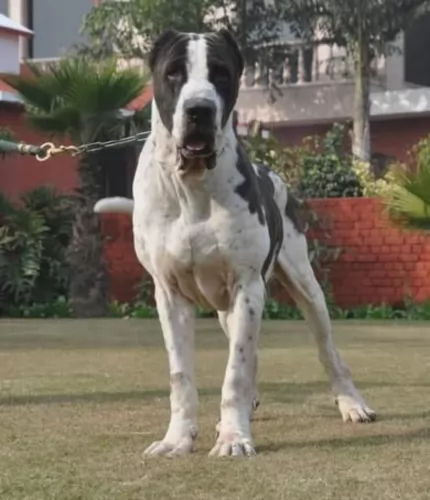 Alangu Mastiff is a breed that ,originates from southern India. Since the very beginning of this breed, it has been used as guard dogs and official dogs of Persian Army. They have been used mostly for wars and as a guard dogs for protection. Also, Alangu Mastiff was used as large gain hunters because of its size and power.
Alangu Mastiff is a breed that ,originates from southern India. Since the very beginning of this breed, it has been used as guard dogs and official dogs of Persian Army. They have been used mostly for wars and as a guard dogs for protection. Also, Alangu Mastiff was used as large gain hunters because of its size and power.
 The Jonangi, known also as the Jagilam or Kolleti Jagilam is an Indian breed of dog which has always been used for hunting and herding.
The Jonangi, known also as the Jagilam or Kolleti Jagilam is an Indian breed of dog which has always been used for hunting and herding.
The dog isn’t seen abundantly in India and it isn’t recognized by any major kennel clubs in India. It isn’t recognized as a pure” breed and there is also concern that the dog is reaching extinction.
Because of interbreeding with other dogs, there is quite a bit of variation in the Jonangi breed.
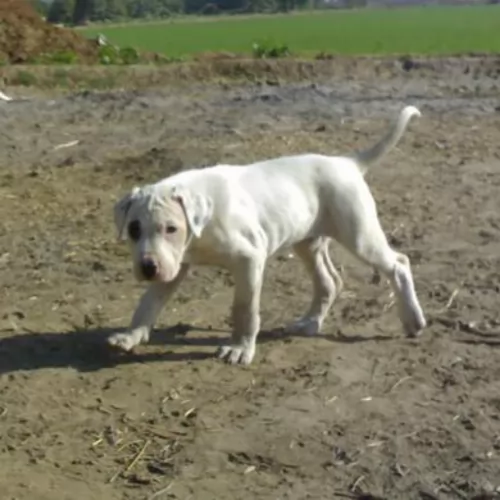 Weight of Alangu Mastiff depends but approximately, male weight is 70-90kg, while females are 60-70kg. While males height is 76-86cm. Females are slightly smaller with an average height of 75-80cm.
Weight of Alangu Mastiff depends but approximately, male weight is 70-90kg, while females are 60-70kg. While males height is 76-86cm. Females are slightly smaller with an average height of 75-80cm.
Lifespan depends drastically on every breed, but it is approximately 8-10 years.
The average litter size of Alangu Mastiff is 6-8 puppies.
Another Name for Alangu Mastiff is Sindh Mastiff.
 The Jonangi is a medium sized dog that stands between 43 – 53cm in height and weighs between 12 and 21kg. He is lean and muscular. Because of interbreeding with the Jonangi dog, the colors of their coats can vary and be anything from fawn, white, tan, black, bi-colored or even brindle. The coat is very short and fine which helps it cope with the extreme heat of the environment.
The Jonangi is a medium sized dog that stands between 43 – 53cm in height and weighs between 12 and 21kg. He is lean and muscular. Because of interbreeding with the Jonangi dog, the colors of their coats can vary and be anything from fawn, white, tan, black, bi-colored or even brindle. The coat is very short and fine which helps it cope with the extreme heat of the environment.
The ears are erect, the forehead is often wrinkled and the long tail is held out straight or it hangs down low. The ears are fairly short and are somewhat floppy.
The Jonangi is capable of being a true family pet, becoming loyal and devoted to his human family. This isn't a particularly intelligent dog but they're even tempered, fun loving, social and easy to please.
You'll find them getting on well with other pets in the home and children too. An interesting aspect with this dog is that he seems to like digging a hole and lying in it, even preferring this to the regular dog beds you get.
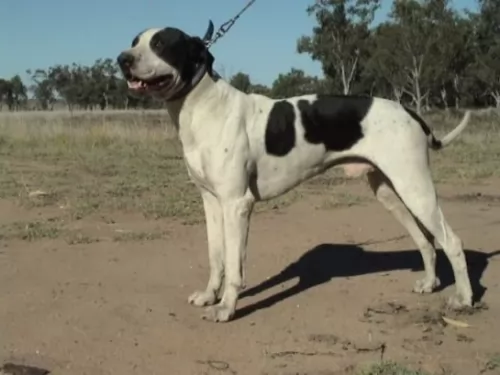 Alangu Mastiff is a very powerful breed. They are a giant breed that is very strong and protective. If you are first time owner, you definitely don’t want this breed as your first pet. They can be very aggressive, and if you are not a dominant owner who knows what he is doing all the time, you can have a lot of troubles with this breed. Alangu Mastiff is a guard dog, and they tend to protect the family no matter what is happening. Of course, with proper care and socialization, they can be wonderful pets that love family, and they can be gentle with children too. Basically, it is very important to socialize them from the earliest age. Alangu is also very hard to train, so you have to be patient and devote a lot of time to train your dog properly. Since they are large dogs, they require a lot of exercises. Walking with the leash is not enough for this breed. They need to run to be fully happy. They can be very aggressive towards other dogs, so it is not very recommendable to spend time with other pets, at least not if they are not socialized. If you train them from an early age, then you should still be careful how your dog behaves around other pets and animals. Don’t get this wrong, Alangu can be a wonderful pet for the whole family, but you have to be careful and well-trained for this breed. They require a lot of attention, patience and time, but overall they can be amazing pets.
Alangu Mastiff is a very powerful breed. They are a giant breed that is very strong and protective. If you are first time owner, you definitely don’t want this breed as your first pet. They can be very aggressive, and if you are not a dominant owner who knows what he is doing all the time, you can have a lot of troubles with this breed. Alangu Mastiff is a guard dog, and they tend to protect the family no matter what is happening. Of course, with proper care and socialization, they can be wonderful pets that love family, and they can be gentle with children too. Basically, it is very important to socialize them from the earliest age. Alangu is also very hard to train, so you have to be patient and devote a lot of time to train your dog properly. Since they are large dogs, they require a lot of exercises. Walking with the leash is not enough for this breed. They need to run to be fully happy. They can be very aggressive towards other dogs, so it is not very recommendable to spend time with other pets, at least not if they are not socialized. If you train them from an early age, then you should still be careful how your dog behaves around other pets and animals. Don’t get this wrong, Alangu can be a wonderful pet for the whole family, but you have to be careful and well-trained for this breed. They require a lot of attention, patience and time, but overall they can be amazing pets.
 Life with a Jonangi is easy going as these aren’t finicky dogs – they’re low maintenance, easy going, fairly healthy dogs that want to please you and just be your pet.
Life with a Jonangi is easy going as these aren’t finicky dogs – they’re low maintenance, easy going, fairly healthy dogs that want to please you and just be your pet.
They make excellent companions, being loving and loyal to their human families and getting on well with other dogs and children in the home.
There are those who are trying to revive the breed, and that is a good thing as these are good natured family pets that will be a positive addition to any home.
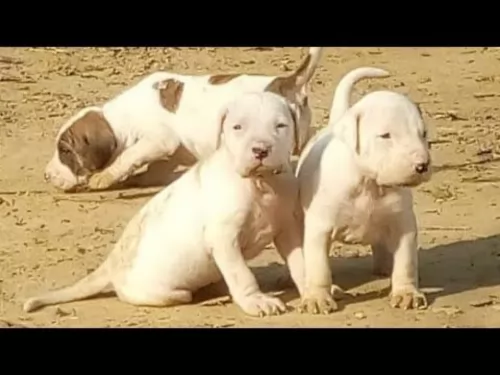 Basically most of the health problems depend on the dog to dog. If you choose puppy carefully, with an adequate examination of professional you will have a healthy dog. Alangu Mastiff is overall healthy breed, but as every other breed, they can develop some issues. Hip dysplasia is can be common for this breed, but again, only if you don’t select your puppy carefully.
Basically most of the health problems depend on the dog to dog. If you choose puppy carefully, with an adequate examination of professional you will have a healthy dog. Alangu Mastiff is overall healthy breed, but as every other breed, they can develop some issues. Hip dysplasia is can be common for this breed, but again, only if you don’t select your puppy carefully.
 This dog is a robust breed, used to living under difficult circumstances. You won't find many inherited diseases with him, but still it pays to know about some of the more common dog illnesses that he might face.
This dog is a robust breed, used to living under difficult circumstances. You won't find many inherited diseases with him, but still it pays to know about some of the more common dog illnesses that he might face.
With any dog, the joints can take quite a pounding which can lead to injuries. You may notice your dog doing less and having difficulty with common activities. Your dog may even have lameness. Your vet will try to avoid surgery and look at things such as diet and weight management. There are also medications, anti-inflammatories and pain relievers.
Ear infections are common with dogs and can be caused by allergies, ear mites and bacteria in the ear canal. Your Jonangi may be tilting his head or shaking it, he may be constantly scratching his ear, he may even have lack of balance and an unpleasant odor coming from his ear because of a discharge. Take him to the vet as soon as you think he has an ear infection.
This problem which affects a dog’s lower urinary system can be totally debilitating for your dog. There are many problems which can cause this problem in your pet and which can lead to health conditions such as incontinence.
Older dogs and those with diabetes are more prone to urinary tract problems. Your dog will strain or yelp with discomfort when trying to pass urine. The urine may be very cloudy or even have blood in it and there may be dribbling of urine too. Other signs can be vomiting, lethargy, back pain, weight loss and change in appetite. See your veterinarian for immediate medical attention. It is considered a medical emergency.
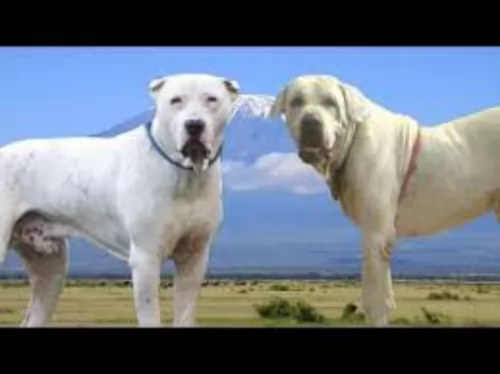 Feeding of your dog highly depends on activity, size, and food that you are feeding your dog. 5-10 cups of high-quality food divided into 2 meals would be enough for an average Alangu Mastiff, but again, you should feed your dog based on activity.
Feeding of your dog highly depends on activity, size, and food that you are feeding your dog. 5-10 cups of high-quality food divided into 2 meals would be enough for an average Alangu Mastiff, but again, you should feed your dog based on activity.
Puppies must eat 3-5 times per day, few cups of high-quality food. They need to eat quality food with a lot of vitamins and minerals to develop into a happy and healthy adult.
Groming is one of the easiest jobs that you should do around your Alangu Mastiff. They are very easy to take care off. Few brushes every now and then would be enough to have perfectly groomed pet. They do not have long coats with a lot of fur so there will be no hair around the house, and maintaining this majestic creature is very easy.
 With commercially manufactured dog food, there are companies that make quality foods that are formulated for certain conditions such as joint health. They have additives in them such as fish oils which decrease inflammation. Always look for a food that is appropriate for your dog’s age and energy levels.
With commercially manufactured dog food, there are companies that make quality foods that are formulated for certain conditions such as joint health. They have additives in them such as fish oils which decrease inflammation. Always look for a food that is appropriate for your dog’s age and energy levels.
Add in your own home-made food to his dry kibble such as cooked chicken, brown rice and pasta as well as vegetables and also try to include some raw meat into his kibble from time to time. Fresh, cool water should be available to him night and day.
With his short coat, the dog is looked upon as low maintenance. Brush him a couple of times a week to make sure the coat remains shiny. Check his eyes, ears and teeth for infections.
This dog is lean, energetic and agile. With his long strides, he likes to run over terrain sniffing and following scents. He is more suited to life in the countryside than to the city. Make sure you have a reasonable sized garden for him and meet his exercise needs by taking him on walks and playing ball and fetch games with him.